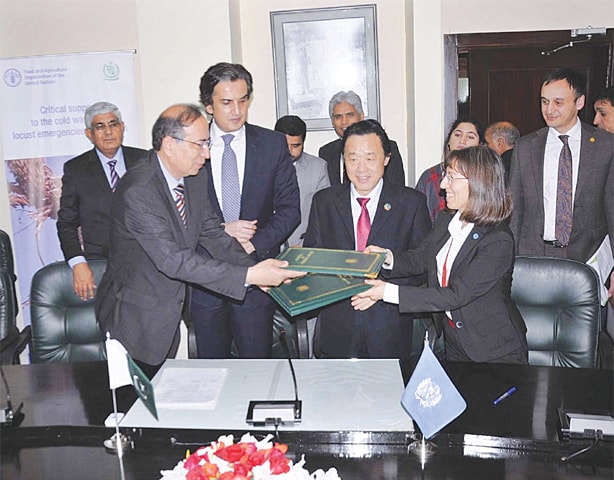
ISLAMABAD: Pakistan and the United Nations’ Food and Agriculture Organisation (FAO) signed two agreements on Saturday to control the desert locust attack and shift the Indus Basin agriculture from a current situation of high vulnerability to an alternative paradigm with water management and farming practices resilience to climate change.
FAO director general Qu Dongyu signed the ‘Technical Cooperation Programme’ with Minister for National Food Security and Research Khusro Bakhtiar on Saturday, under which FAO will make available $700,000 to Pakistan for the desert locust emergency measures.
According to a preliminary assessment conducted by the agriculture departments of Sindh and Balochistan, about 80,000 hectares of crop have been damaged besides serious damages to grazing and forest lands.
The most time-critical action now is to effectively eliminate adult locust and hopper bands in already identified breeding zones in a bid to protect crops and livelihoods of at-risk poor farming households.
Agreements signed with the ministries of food security and climate change
As per the estimates provided by the agriculture department Balochistan, the locust attack has incurred about Rs4627.79 million worth agriculture losses in the province alone. Likewise, the affected crop area in Balochistan is around 45,098 hectares, and damaged crops include wheat, gawar, mustard, barley, pulses, garlic, vegetables, fodder, onions, and cotton and horticulture crops.
Later, addressing a news conference, Mr Dongyu said that the locust situation in Pakistan is so far under control, but “we have to work as quickly as possible”. Air force can be mobilised to control the swarm with aerial spray. In April with the start of the new season, swarm increases in large numbers and that is the real disaster. In Pakistan several swarm groups are in limited areas, and “if we can cure, we can prevent a bigger disaster”, he further said.
The FAO director general will visit locust affected areas in Multan district on Sunday (today).
The second agreement was signed by the FAO chief with Minister for Climate Change, Malik Amin Aslam. The FAO’s climate change resilience project in Pakistan for which the Green Climate Fund approved $47 million will directly benefit 1.3 million people. The project is designed to transform Indus River Basin by improving agriculture and water management to make this vital food-producing region more resilient to climate change.
This is the first FAO-led GCF project in Asia — an important step forward in FAO’s broader support to countries to respond to climate change in partnership with the GCF.
In the Indus River Basin, agriculture employs nearly 26 per cent of Pakistan’s labour force and produces more than 90 per cent of the country’s agriculture products. However, extended droughts and floods have affected millions of people in recent years. Such extreme weather events are expected to become more frequent and severe in Pakistan as a result of climate change.
Mr Qu also met Special Assistant to Prime Minister on Poverty Alleviation and Social Safety Dr Sania Nishtar and discussed the potential avenues of collaboration to support rural women in Pakistan. FAO is willing to support ‘Ehsaas’ programme which aims to eradicate extreme poverty and lift lagging districts.
The FAO chief visited the parliament house on Saturday and held a meeting with members of the NA special committee on food commodities. Member of the committee Syed Fakhr Imam briefed the FAO chief on the working of the special committee as well as the issues facing the country’s agriculture.
Published in Dawn, February 16th, 2020













































